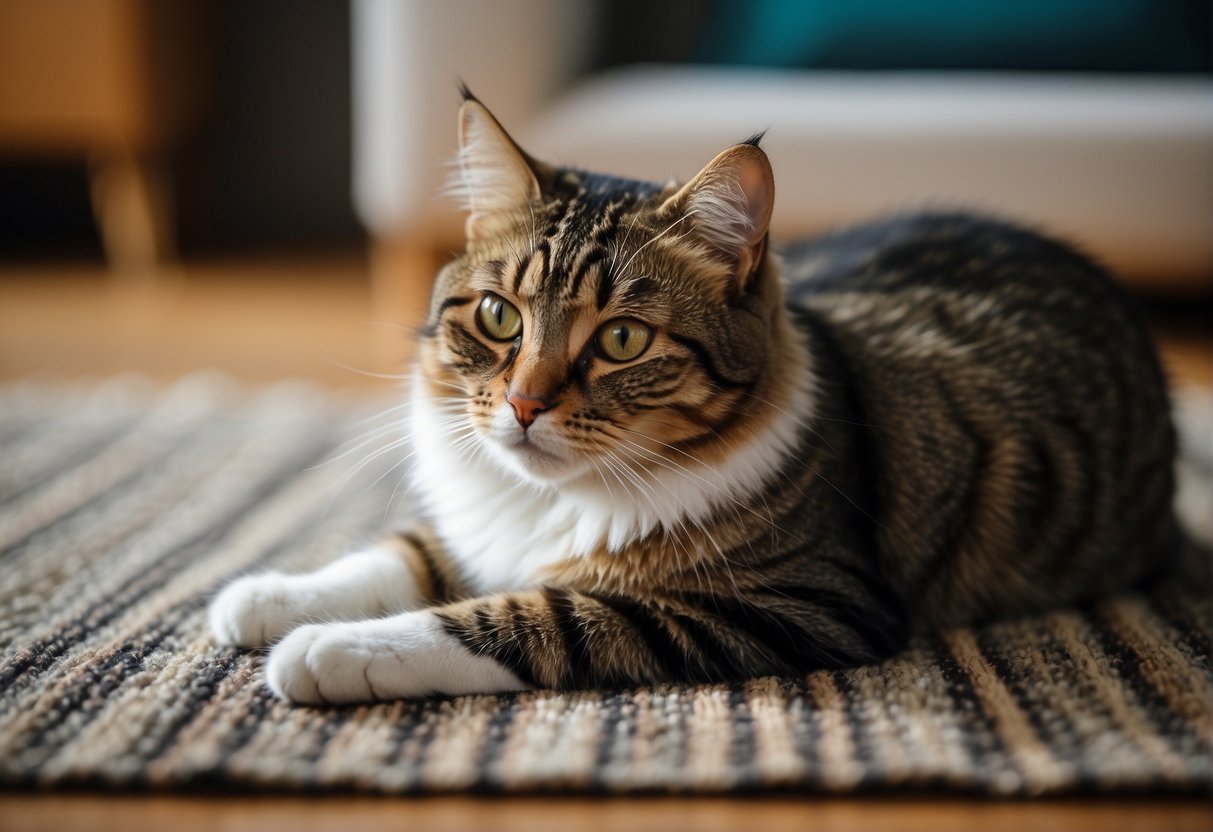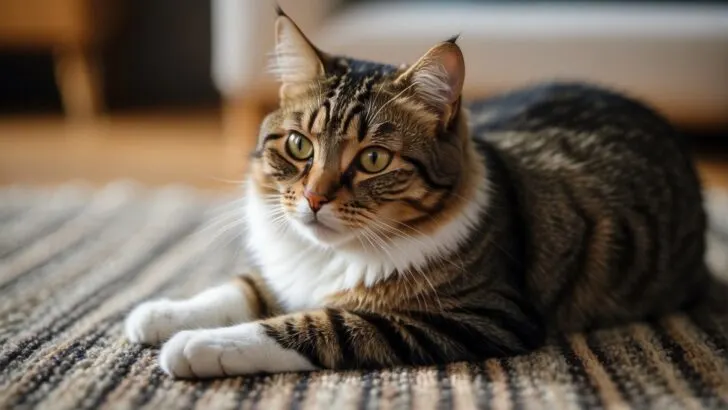When your cat licks your feet, they might be displaying affection or engaging in social grooming, a behavior they typically share with their feline pals. Like how they tenderly clean each other, your cat may extend this sign of care and trust to you.
My own furry friend does this frequently after I’ve been away for a while, seemingly as their way of reconnecting.

Another reason could be your unique scent, which cats often feel the need to intermingle with their own. The glands on your feet emit a distinct smell that can be comforting to them.
Recall that cats have a powerful sense of smell and your feet, full of sweat glands, carry a lot of personal information in the form of scent. It’s much like leaving their signature or claiming a friendly “This is my human!”
Lastly, cats lick as part of their exploratory behaviors, akin to how they sniff new objects or places. Your feet, rich with smells from all the places you’ve been, can be like a new frontier for your cat’s curious mind.
Physiological Reasons Behind Licking Feet
Cats exhibit a range of behaviors that can be intriguing, and licking your feet is one that’s often related to their natural instincts. Two physiological factors play key roles here: the allure of taste and smell, and the inherent drive to explore their environment.
Taste and Smell Attraction
Your feet carry a distinct cocktail of scents and tastes that are fascinating to your feline friend. The sweat glands on your feet excrete sweat, which carries salts, and body oils that may be appealing to your cat.
This can especially be the case if you’ve just finished a workout or have been wearing shoes that enhance the buildup of these substances.
- Salts: A natural component of sweat that could attract your cat.
- Oils: Skin naturally produces oils which may hold interesting scents for your cat.
- Papillae on tongue: The tiny, spiky structures on your cat’s tongue are designed for grooming and are adept at detecting textures and tastes.
Cats rely heavily on their sense of taste and smell to understand the world, and your feet are a rich source of information.
Foot Licking as Exploratory Behavior
Beyond just taste, licking can be a way for cats to satisfy their curiosity. In the wild, cats use exploratory grooming as a method to assess their environment and familiarize themselves with the objects and creatures within it.
Your feet, which trek in from the outside daily, bring with them a myriad of storytelling elements and novel stimuli for your cat to investigate.
- Exploring: This behavior can be driven by their natural curiosity about their surroundings.
- Attention-seeking: Sometimes, your cat may lick your feet as a way to engage with you and seek your attention.
Through licking, cats not only explore but also strengthen their bond with you, associating your scent with safety and comfort.
Managing and Responding to Foot Licking
Connecting with your feline friend includes understanding their quirks, such as foot licking. It’s important to recognize when this behavior is a sign of affection, a bid for attention, or something that may require a professional opinion.
When to Seek Professional Advice
If your cat’s licking becomes excessive or is accompanied by signs of stress or compulsive behavior, it may be time to consult a veterinarian. Be mindful of skin irritations or signs that your cat is licking due to discomfort from parasites.
A medical professional can determine whether the licking is a symptom of an underlying health issue and may suggest behavior modification strategies or medication.
Positive Responses to Feline Affection
When your cat licks your feet, it’s often their way of showing affection or seeking your attention. To acknowledge this, you can offer a gentle pet or a scratch behind the ears. This positive reinforcement tells your cat that their affection is appreciated, reinforcing the bond between you.
Reducing Unwanted Licking Behavior
To discourage unwanted foot licking, you can redirect their attention with toys or engage them in play to satisfy their need for interaction. Establishing and respecting territory can help; ensure your cat has their own space where they can sleepand relax. Here are simple steps to gently dissuade your cat:
- Redirect: Offer a toy or initiate playtime when licking starts.
- Routine: Create a scheduled playtime to prevent attention-seeking behavior.
- Restraint: Gently move your foot away and avoid unintentional reinforcement.
- Professional help: Engage a cat behaviorist for behavior modification techniques if habits persist.
Understanding Foot Licking in Different Contexts
Let’s explore what different licking patterns may mean for your cat.
Distinguishing Normal Vs. Compulsive Licking
Normal Behavior for Cats: Licking is part of a cat’s self-grooming routine, and it’s generally normal for them to extend this behavior to their owners as a sign of affection and hygiene. If you notice your cat gives occasional licks to your feet, it usually indicates a happy, bonding moment.
Compulsive Behavior: When licking becomes excessive or frantic, it may signal an anxious cat or one that’s potentially engaging in overgrooming. This can be due to stress or medical issues. Keep an eye out for licking accompanied by other signs of distress.
Cats’ Response to Owners’ Scent on Feet and Shoes
Cats have an advanced sense of smell, and they may lick your feet or shoes as a way of interacting with your scent. Your shoes carry smells from all over, and these scents are intriguing to your cat’s olfactory system. It can be seen as:
- Your cat recognizing and being comforted by your unique scent.
- A cat marking their territory through rubbing and licking to mix their scent with yours.
Contextual Analysis by Animal Behaviorists
Animal behaviorists note that foot licking can often be an attention-seeking behavior. If you’ve been away or busy, your cat might lick your feet as a direct way to say, “Hey, I’m here, and I’d like some attention.”
Conversely, if your cat is generally aloof but starts licking your feet, it could be their subtle way of communicating or asking for companionship.
To understand your cat, consider the context:
- Does the licking happen at a certain time of day or when you return home?
- Is there a change in the household that could be affecting your cat’s mood?

My name is James, and welcome to FAQCats!
Along with our team of cat owners, expert pet enthusiasts, and pet professionals, we aim to write engaging helpful, engaging content about cats. At FAQCats we strive to provide content that’s accurate and fun to read. Our team writes about everything related to cats; even the most complex of topics. Through extensive research and caring for our own fur-pals, we’re able to provide something cat owners worldwide will love. Have a look around, and leave us feedback anytime!

